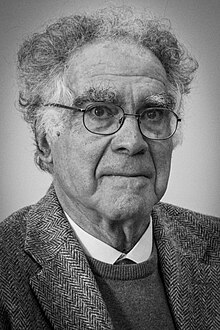Carlo Ginzburg (Italian: [ˈkarlo ˈɡintsburɡ]; born 15 April 1939) is an Italian historian and a proponent of the field of microhistory. He is best known for Il formaggio e i vermi (1976, English title: The Cheese and the Worms), which examined the beliefs of an Italian heretic, Menocchio, from Montereale Valcellina.
Carlo Ginzburg
| |
|---|---|

Ginzburg in 2013
| |
| Born | (1939-04-15) 15 April 1939 (age 85)
Turin, Italy
|
| Alma mater | University of Pisa |
| Occupation(s) | Historian and microhistorian |
| Parent(s) | Natalia Ginzburg and Leone Ginzburg |
In 1966, he published The Night Battles, an examination of the benandanti visionary folk tradition found in sixteenth- and seventeenth-century Friuli in northeastern Italy. He returned to looking at the visionary traditions of early modern Europe for his 1989 book Ecstasies: Deciphering the Witches' Sabbath.
The son of Natalia Ginzburg, a novelist, and Leone Ginzburg, a philologist, historian, and literary critic, Carlo Ginzburg was born in 1939 in Turin, Italy.[1] His interest for history was influenced by the works of historians Delio Cantimori and Marc Bloch. He received a PhD from the University of Pisa in 1961. He subsequently held teaching positions at the University of Bologna, the University of California, Los Angeles (1988–2006), and the Scuola Normale Superiore di Pisa. His fields of interest range from the Italian Renaissance to early modern European history, with contributions to art history, literary studies, and the theory of historiography.[2]
In 1979, Ginzburg formally requested that Pope John Paul II open the Inquisition Archives. While the immediate response of the Vatican has not yet come to light, a limited group of scholars had been granted access by 1991. In January 1998 the archives were formally opened to "qualified researchers." Cardinal Ratzinger (who later became Pope Benedict XVI) credited Ginzburg, and his 1979 letter, as having been instrumental in the Vatican's decision to open these archives.[3] Ginzburg had his doubts about using statistics to reach a judgment about the period. “In many cases, we don’t have the evidence, the evidence has been lost,” said Ginzburg.[4]
Along with Paul Ginsborg, Marcello Flores, Sergio Luzzatto, Claudio Pavone, Enzo Traverso, etc., Ginzburg called, in January 2002, for the rejection of a bill, presented by Justice Minister Clemente Mastella, that would have outlawed Holocaust denial. They argued that Italy's legislation was sufficient to cope with such acts. The amended bill finally restricted itself to reinforcing sentences concerning hate speech.[5]
He was awarded the 2010 Balzan Prize[6] and was elected an International Member of the American Philosophical Society in 2013.[7]
InThe Night Battles and Ecstasies, Ginzburg traced a complex path from certain European witch persecutions to the benandanti and a wide variety of practices which he describes as evidence of a substrate of shamanic cults in Europe. His 1999 work, The Judge and the Historian, sought to expose injustice in the trial of Adriano Sofri, but failed to win a new trial. His book was not only about Sofri but was also a general reflection on the scientific methods used by a historian, and their similarity to the work of a judge, who also has to correlate testimonies with material evidence in order to deduce what really happened. Thus, he explains how the judicial model of early historiography made it focus on easily verifiable facts, resulting in studies that centred on individuals or on what Lucien Febvre and Marc Bloch called in the Annales d'histoire économique et sociale an "evenemential history". In his book History, Rhetoric, and Proof (1999), he contrasts the ancient rhetoric of Aristotle with the modern rhetoric of Nietzsche.[2]
{{cite book}}: CS1 maint: location missing publisher (link) (revised edition, 2000){{cite book}}: CS1 maint: location missing publisher (link) (First published in Italian as Storia notturna: Una decifrazione del Sabba, 1989){{cite book}}: CS1 maint: location missing publisher (link){{cite book}}: CS1 maint: location missing publisher (link) (First published in Italian as Il giudice e la storico, 1991){{cite book}}: CS1 maint: location missing publisher (link){{cite book}}: CS1 maint: location missing publisher (link){{cite book}}: CS1 maint: location missing publisher (link){{cite book}}: CS1 maint: location missing publisher (link)